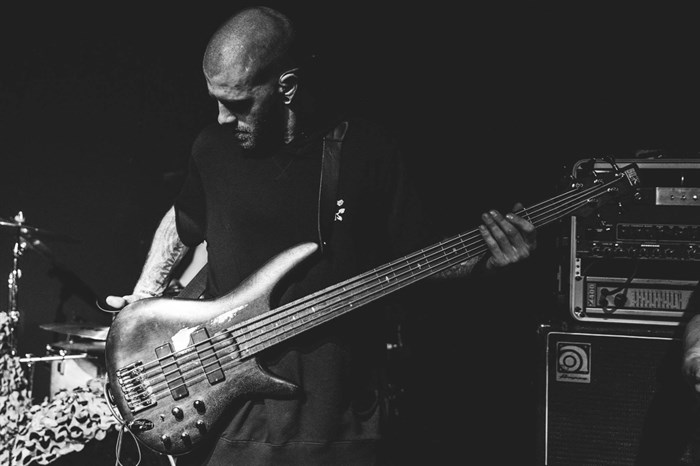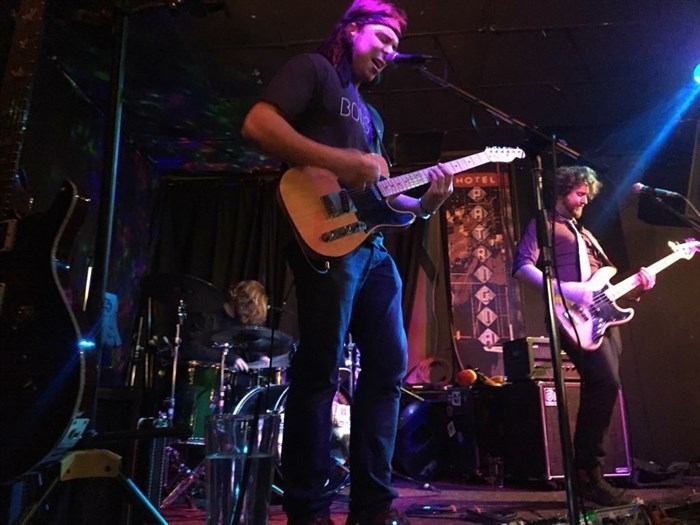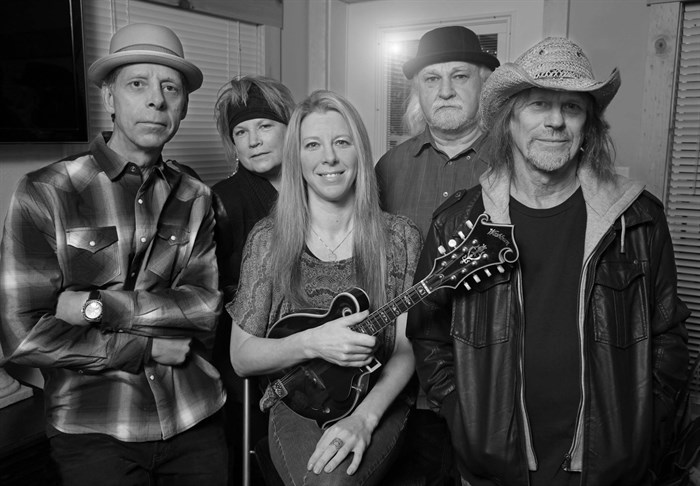
Quinn McGraw of Living Machines during a recent performance.
(CONTRIBUTED / iNFOnews.ca)
March 28, 2018 - 8:00 PM
'I HAVE TO PRACTISE MY GUITAR AT SOME POINT'
Some still say you have to go to L.A. or at least Vancouver to make it in the music biz, but digital technology means musicians can now make a go of it far from the traditional epicentres of music. We talked to a few locals about that...
Still in his mid-20s, Quinn McGraw is already a musical veteran and says he’s seen a shift even in the last few years as digital technology and social media continues to enhance and disrupt the music industry.
"Sure, the tried and true methods of travelling and playing live shows will never die and are clearly still in practice, but there seems to be an observable level of attention that goes into social profiles and digital marketing — now more than ever,” he adds.
"We can pay to put ourselves in front of thousands of people without ever leaving our city via Facebook, Instagram, and other social media. I wouldn't say that it's necessarily easier or harder to make it now, but you can really feel the hustle of a lot of bands if you spend a few minutes scrolling through your socials."
McGraw's band Living Machines held the release party for its first album I: After Onyx in Kelowna on March 25 and says the digital revolution has made it both financially feasible and technically possible to put out an album in your bedroom.
"When it comes to recording, with a few bucks you can grab an interface, download some production software, and learn the basics of audio engineering from YouTube,” McGraw says, pointing to advances in audio engineering software. “It’s powerful enough to compete with a studio... without needing in-depth knowledge on mixing.”
McGraw describes the way I: After Onyx was put together and how it could have been done from pretty much anywhere in the world.
"I recorded all of the guitars and vocals in my bedroom on my laptop, and we programmed drums and string/choir sections in MIDI with samplers that can barely be distinguished from real organic sources,” he says.
"Next, we e-mailed the sessions to DNA Music Studio in France to have them mixed; sourced an album layout from Eyeheart Creative in Prince George; uploaded all of the album art and sent it to CDBaby in the U.S. to have albums pressed and finally, digitally distributed the album across all music platforms — iTunes, Apple Music, Google Play, Spotify — with a few simple steps through Distrokid,” McGraw says. "In short, we can wear many industry hats with nothing more than a computer and the internet and source work from anyone in the world if they're linked in.”
For McGraw, putting the means of production in the hands of musicians doesn’t guarantee success, it just makes it a bit more democratic.
"Even if anyone can have a professional sound, look and brand for their band now, the beautiful thing about it is that we see new bands popping up all of the time, completely independently,” he says. "It’s a very different age for bands now. I can't imagine how different things will be for us 30 years from now, but all we can do is roll with the punches."
•••

The Carbons.
(CONTRIBUTED / iNFOnews.ca)
'NO LONGER TANGIBLE'
Band leader Tomy Tisdale says he thinks it’s generally easier for a band to get started today but that digital disruption has also disrupted people’s perception of what music is worth.
“There is, unfortunately, less and less money going into the music industry because people aren’t willing to pay for music like they used to,” Tisdale says.
Ironically, he blames that on digitization itself and the fact that unless you buy vinyl, you don’t physically get much for your money when purchasing music.
“Music is no longer tangible,” he says. "Everything is now digital and most people have a hard time assigning monetary value to intangible things.”
That said, Tisdale thinks there are many more opportunities in today’s music business, given the vast reach of the internet.
“Even though people pay less for music, you have a greater market that you can capitalize on,” he says. "Even 20 years ago, in order to make a decent living playing music, you had to have a lot of cash to get started for recording, making a video and printing records or be lucky enough to get a record deal."
"On top of that, you didn't have the internet to help you seek out gigs or industry contacts like you do today. Sure you had phone books but with the internet and smart phones today, you literally have thousands of contacts at your fingertips.”
His latest band The Carbons have just completed their first album and are planning the release party for Vancouver in May.
Unlike McGraw, the band chose a more traditional setting, recording their album August Ash in Arc House Studios in Kelowna.
Now in his late-20s, Tisdale says he began recording music a decade ago and describes his experience.
"I started recording when I was 18 using a laptop version of the industry standard Pro tools software and hardware that I purchased for $300,” he remembers. "Add a shure SM57 and an AT2020 to that (two cheap but effective microphones) for another $200 and I had myself a college-dorm-room studio. One of the mics even came with headphones.”
"Most musicians 30 years ago could not have even imagined this to be possible. Fast forward to today, I can do that and record and edit videos from my smartphone,” Tisdale says. "Obviously the recording quality expectations from radio stations have also evolved but you can get started now with some decent demos to get a fan base with hardly any money down."
But the new age has also forced musicians to take a broader role in their business.
"I have to book my own gigs, know how to record, do my own sound, be a promoter, do my accounting and taxes, record and upload videos, manage my social media accounts, sell tickets and I have to practice my guitar at some point,” he laughs.
•••

Barry Mathers (far right) with the band Dirt Road Opera.
Image Credit: Contributed
'ACCESSIBLE TO THE WORLD'
As a long-time musician who’s worked both sides of the mixing board, Barry Mathers has a surprisingly young take on today’s digital music scene.
"Thirty years ago it wasn’t possible to get a song on the radio or even record it for that matter unless you had a record deal, which wasn’t easy to get,” says Mathers, who’s most famous in these parts as one of The Cruzeros, but also now owns and operates Redhouse Recording in Kelowna.
“When I started out, recording with a tape machine meant physically cutting the tape and trying to piece it back together properly. Total commitment. No turning back,” Mathers remembers. "Now you can make the edit on the computer and if you don’t like it, hit undo and try again.”
Technology has made music recording much more accessible, he says.
"Now a basic home recording studio is capable of putting out a radio ready song, if you know what you’re doing. Upload it to iTunes, Spotify and Youtube and it’s accessible for the whole world to hear,” he adds.
Beyond the actual music, Mathers says the internet and social media have made doing business much easier, too.
"Many artists have been discovered and gone on to successful careers by uploading a song they sang in their living room,” he points out.
"Building a fan base and offering albums and merchandise online means you’re not restricted to just selling them at live shows. Make your own posters and CDs, book a show, advertise it on your web page and Facebook and you're off to the races."
But however much digital technology has revolutionized record making, Mathers says, it still can’t replace talent.
"Computers and the internet have made recording and promotion much easier but there’s still no shortcut to being a good musician, you still have to put in your 10,000 hours,” he adds.
But putting those hours in has been made easier too, Mathers says, allowing fingertip access to lyrics and music.
"When we tried to learn a song back then, the only way to transcribe it was to buy the record and listen to it over and over until you could figure out the chord changes and words,” he recalls. "Good luck trying to decipher what Mick was saying. Now you simply go to a lyrics page or YouTube and with the click of a mouse you’ve got it all.”
LIVE MUSIC MORE SCARCE
During its heyday, Mathers says The Cruzeros had seven videos in rotation on CMT, the equivalent back then to scoring a viral video on the internet now.
“That went hand in hand with getting more radio airplay and gave us a much larger audience which led to playing bigger concerts and festivals,” Mathers says.
Live music was also more popular back then, Mather maintains, making it much more possible to make a living at.
“Gigs are far more scarce these days and unfortunately, the pay isn’t much different than it was back then,” Mather adds.
But 30 years on, despite the many changes, Mathers says he still loves what he does.
“I wouldn’t have imagined that I’d still be doing it today, with as much enthusiasm as I had in my first band way back when,” he adds.
As a grizzled veteran of the local music scene, Mathers offers this advice to newbies: "If you truly love music, if your heart is in it 100 per cent and there’s nothing else in the world you’d rather do then give it all you’ve got and put in those 10,000 hours. If not, run the other way as fast as you can."
To contact a reporter for this story, email John McDonald or call 250-808-0143 or email the editor. You can also submit photos, videos or news tips to the newsroom and be entered to win a monthly prize draw.
We welcome your comments and opinions on our stories but play nice. We won't censor or delete comments unless they contain off-topic statements or links, unnecessary vulgarity, false facts, spam or obviously fake profiles. If you have any concerns about what you see in comments, email the editor in the link above.
News from © iNFOnews, 2018